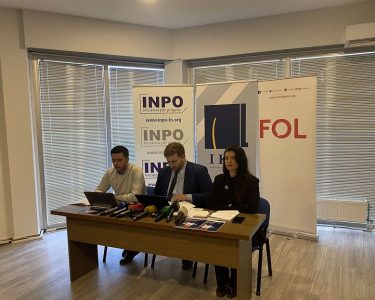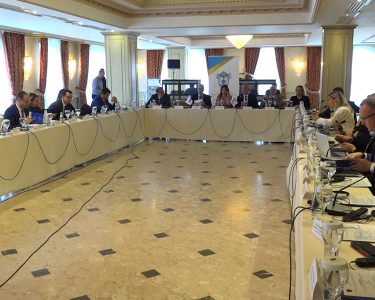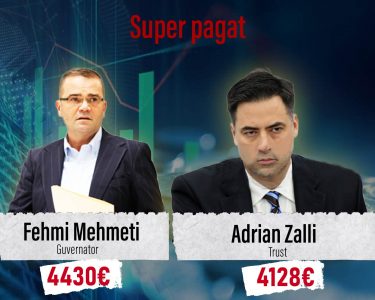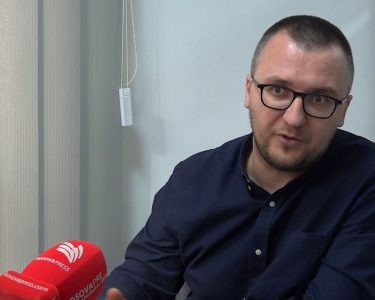About 350 seized cars in the warehouse of the Agency for Administration of Sequestrated or Confiscated Assets (AASCA) await a decision on confiscation or return to the owner. Among them, there are cars sitting for a decade waiting for a court decision, which has caused them to be depreciated.
In addition to cars, the Agency also takes care of other seized property such as gold ornaments, telephones, other valuables, or even narcotic substances. While the money is kept in the Central Bank of Kosovo, real estate is often given to institutions for use.
According to the national report on the fight against economic crime, the year 2022 is again characterized by relative success in the field of seizure and confiscation of property acquired through criminal activity. While according to the report, the seizure marks an increase not only compared to 2021, the confiscation represents a slight decrease compared to 2021.
“In 2022, the prosecutor’s offices froze/seized 20,728,945.42 euros, while 669,765.14 euros were confiscated… In this year (2022), 37 cases with final confiscation were reported, which represents a record of all these years, in terms of the number of cases ended with confiscation”, the report states.
While only in the first quarter of this year, the Agency for Administration of Sequestrated or Confiscated Assets says that the approximate value of seized and confiscated assets is around 160 thousand euros.
The Acting Director of the Department of Acceptance, Valuation, Preservation of Value and Sale of Seized and Confiscated Assets, Alban Sutaj, says that during the period January – March 2023, they received 22 court decisions, of which nine were for sequestration and 13 were for confiscation.
“In 2022, we received a total of 104 decisions, of which 39 decisions were for sequestration, 64 for confiscation and one for freezing. Meanwhile, during the period January-March (2023), we received 22 court decisions, of which 9 were for sequestration and 13 were for confiscation. The approximate value for this period (January-March) is 159,798 euros… Also, we have conducted 12 auction procedures, i.e., sale of assets in accordance with judicial procedures, we have returned 15 assets, and we have also given 13 assets for use to different institutions”, said Sutaj.

However, the fact that there is such a big difference between the assets frozen and seized and those confiscated by final judgment is a concern for Lavdim Makshana, researcher at the Kosovo Institute for Justice (IKD).
Even in the national report on combating economic crime for the past year, it is emphasized that the situation in the field of confiscation can and should be improved. According to the same report, with greater commitment, the figure of 37 cases of final confiscation should increase to over 100 cases per year as such a thing is achievable.
“If we refer to the national report on the fight against economic crime, we can see that the value of property seized during 2022 has increased compared to previous years. The property seized by the Prosecutor’s Office is somewhere around 21 million. There is a discrepancy between the seized and confiscated property because if we refer to these statistics, the property that was confiscated by final decision is worth about 669 thousand euros, which is quite a discrepancy between the seized property and that of confiscated”, he says.
Seized and confiscated assets can be sold at auction, given to law enforcement institutions or even returned to their owner, depending on the final decision of the court.
However, the assets are never sold to the owner whose property has been confiscated.
“We do not sell confiscated property to the owner; we only sell it to third parties… The property is not sold to the owner whose property has been seized… He has no right to participate in the public auction”, says Sutaj.
It is considered that there is a prolongation in courts when it comes to making final confiscation decisions, causing many seized assets to remain pending.
This is also emphasized in the national report on combating economic crime, which states that the fact of the depreciation of many assets remains a challenge, either because of the reluctance of judges to sell them, or because of their identification as evidence or and improper justification of sales requests.
“It’s normal for those (seized assets) to lose value over the years. And, we are asking that they be sold as soon as possible and we keep their counter value… In court proceedings, we cannot interfere… There are prolongations in courts when it comes to making confiscation decisions… There are about 350 seized cars in the AASCA warehouse, they await a decision on confiscation or return to the owner… There is probably an asset that can stay up to 4 years in the AASCA warehouse or even longer, they vary”, says Sutaj.

The Kosovo Institute for Justice (IKD), an organization that monitors the justice system, says the same thing.
“What usually happens in our courts is that the assets that are confiscated remain under the administration of the Agency due to the prolongation of the court proceedings. So, since there is no conclusion of court proceedings, the assets are also slowly ruined and depreciated in a way, and they are not worth as much as when they were seized. Then, this is quite a problem for the Agency, because the the assests must be maintenaned, and normally this creates expenses for the Agency, when there are no final decisions from the court on the sale of the assets”, says Makshana.
Throughout the year 2022, it is reported that confiscations, freezing and sequestrations occurred for various criminal offenses, including criminal offenses against corruption. In total, 57 prosecutors were involved in seizing or freezing assets in different cases.
Of the 37 cases with final confiscation, the Basic Prosecutor’s Office of Prizren initiated 17 cases, the Special Prosecutor’s Office two cases, that of Pristina 5 cases, the Prosecutor’s Office of Ferizaj 3 cases, that of Peja 1 case, while the Prosecutor’s Office of Gjakova 9 cases.

The Special Prosecutor’s Office has seized: 4 vehicles, 3 business premises, money, technological equipment. The Prosecutor’s Office of Peja seized: 10 vehicles, money, telephones, wood. The Prosecutor’s Office of Pristina seized: 7 vehicles, money, telephones, diesel, technological equipment.
The Prosecutor’s Office of Mitrovica has seized: 2 vehicles, money, phones, technological equipment. The Ferizaj Prosecutor’s Office seized: 11 vehicles, gold jewelry, money, phones, clothing, food items. The Prosecutor’s Office of Gjilan has seized: 8 vehicles, property, gold, silver, money, wood, animals, telephones, tobacco.
The Prosecutor’s Office of Gjakova seized: 22 vehicles, 1 truck, 2 excavators, money, telephones, technological equipment, alcoholic beverages, while the Prosecutor’s Office of Prizren seized: 17 vehicles, 1 rolex, money, telephones.
However, Makshana says that the cases where there is a confiscation decision are mostly minor cases, while there are very few cases of corruption or terrorism.
“If we look at the past years, there is no big increase in concrete cases for confiscated assets, this is because, as we know in our country, the procedures are too long, then court cases drag on, but even these cases that have been confiscated they are usually minor cases and are not cases where the criminal offense has involved much greater misuse, for example, corruption offences, money laundering offences, terrorism offences, where there is ill-gotten wealth, or when someone has benefited financially misusing the position. So, in these cases, there were no final decisions by the courts. Even in those cases when there were, there were very few. Therefore, the discrepancy between the seized property and the confiscated property is very large”, said Makshana.
According to the data of the report on economic crimes, out of 37 confiscation decisions, 10 cases are for “forgery of documents”, 10 cases are for “unauthorized purchase, possession, distribution and sale of narcotics…”, 4 cases are “smuggling with migrants”, 3 from “organization of pyramid schemes and illegal gambling”.
From one confiscation case, there were decisions for the offenses of “abuse of official position or authority”, “usury”, “money laundering”, “serious theft”, “prohibited trade”, “evasion from payment of mandatory customs fees …”, “smuggling of goods”, “giving bribes in the private sector”, “causing general risk” as well as another case for the offense “import, export, supply, transport, production, exchange, brokering or sale unauthorized possession of weapons or explosive materials”.
Faced with the responsibility that the courts have in this whole process as well as the criticisms for lengthy processes, we have tried to get an answer from the Judicial Council of Kosovo, but until the moment of publication of the article, we have not received one.

Meanwhile, in the Ministry of Justice they say that they are completing and amending the legal infrastructure of all the laws that constitute the unjustifiable confiscation of property.
The Deputy Minister of Justice, Blerim Sallahu, says that through the Confiscation Fund, the assets confiscated by final decision will be distributed for social use.
“We are already in the process of completing the legal infrastructure of all the laws that make up the unjustifiable confiscation of property. Now, in this case, if the money comes from the Bureau which will already be established… and will address the case to the court and the court will confiscate it, then so is the confiscation in the criminal field, it is the Law on expanded powers where even there in the criminal field, any confiscated assets will be added to the fund, and the fund will have a certain commission, where that commission will distribute the assets for the needs of the citizens, for the marginalized groups of society, such as victims who have suffered from domestic violence, people who have been affected by narcotic substances and other marginalized groups in order to integrate them into society,” he said.
However, Sallahu says that during the drafting of the first draft of the Confiscation Bill, they encountered a problem, which they intend to solve in accordance with international standards.
“We are drafting the first draft of the Confiscation Bill, where we have a problem with the monetary fund of confiscation, due to the fact that in the Republic of Kosovo there is only one budget code and it is the competence of the Ministry of Finance, and the law on financial management does not allow to have two budget codes in the Republic of Kosovo. Therefore, here we have a suspension of the work of drawing up the draft of the Confiscation Fund due to the fact that we are now on the verge of the solution and new recommendations from the EU Office and the Council of Europe, to see how to find a better way of communication with the Ministry of Finance, and to find better modalities to have a code, or another special code, or some other alternative form of how the administration of the monetary fund should be done by the Ministry of Justice, because the legislation in power doesn’t allow us to move forward without finding a good solution first. Now we are waiting for some recommendation, in accordance with international standards, I believe very soon, within the next week, we will have recommendations from them”, says Sallahu.
Notice: This feature was produced by the NGO “Center for Innovation and Development” with the financial support of EULEX Kosovo. Its content does not necessarily reflect the views and opinions of EULEX Kosovo








